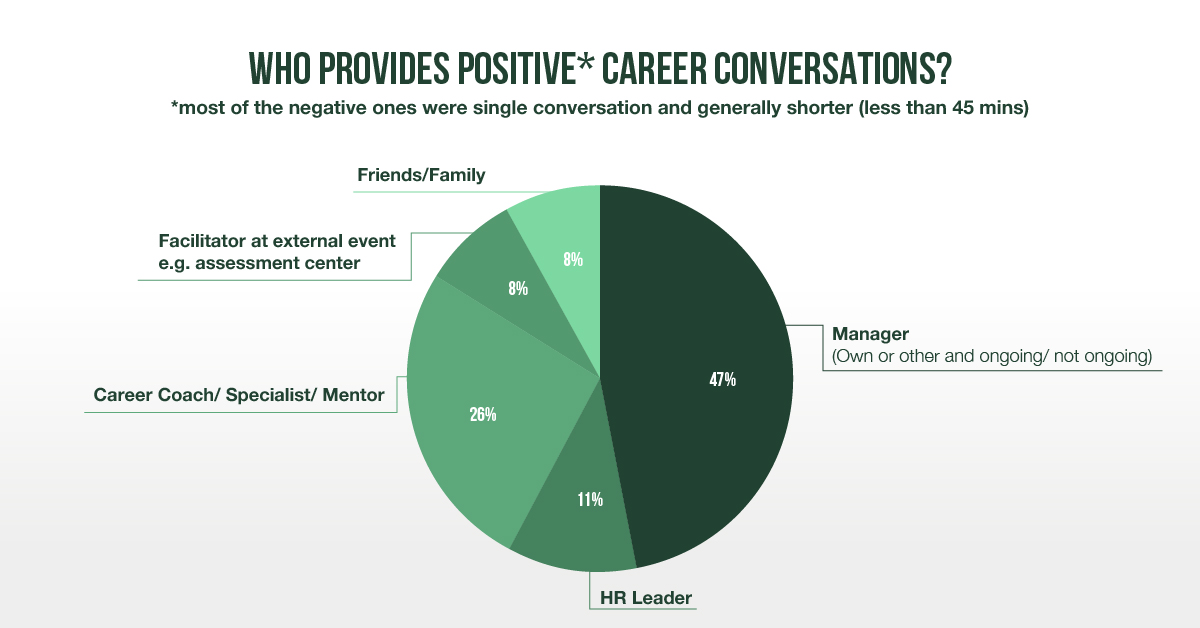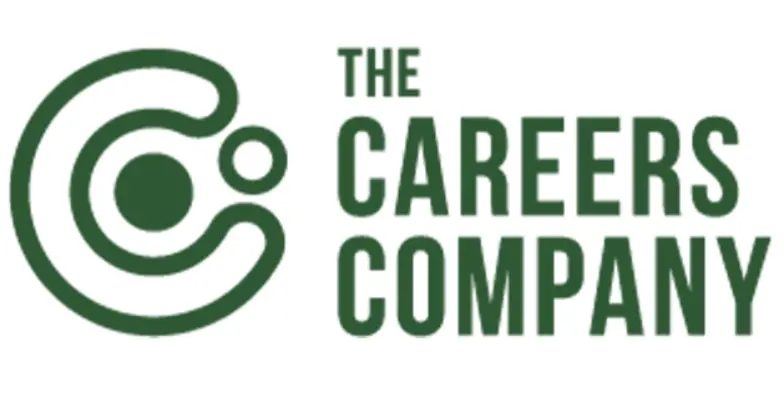For me, the answer to this is “last Wednesday”. I am fortunate. As an executive, I had incredibly supportive managers (you know who you are!) and access to amazing external coaches. Now that I run my own business I have created a network around me where I create space for these conversations.
These conversations helped me make the big decisions in my career: moving to a different country, taking on a bigger role and eventually leaving corporate life! Other times they have supported me in dealing with career challenges such as engaging a new team or learning how to deal with a particularly difficult stakeholder.
But it wasn’t always like that. At school, I don’t remember having a single conversation about my career. My career choice was determined by fortunate “happenstance”[1] rather than as a result of a series of structured careers conversations. It’s also certainly not the case for everyone either. While the story for schools in the UK is better (we are still not there though), in organisations managers are often reluctant to engage in these conversations because of: the time commitment, their lack of skill or fear that the outcome of the conversation may encourage their team members to leave! And formal coaching programmes are often reserved for the executive cadre of an organisation. That’s why I created The Careers Company… to democratise, demystify and champion all types of Career conversations!
But what exactly is a Career Conversation?
At a very basic level, a Career Conversation is an:
“Ongoing dialogue between a coach (or manager/mentor) and an individual, focused on helping the individual make career-related decisions and deal with career-related issues”[2].
Who do these Career Conversations happen with?
Research[3] suggests that more than half (c.58%) of the positive Career Conversations happen within the workplace – with a manager (either their own or another) or the HR team. The remainder happen with an external specialist (e.g. a certified career coach or mentor) or a friend/work colleague.

Why are these conversations so important?
Let’s face it, the world of work is complex, careers are becoming more global, we are continually being asked to adopt new ways of working, workforces are more diverse and competition for the most coveted roles remains fierce. Coupled with the effects of COVID and the Great Resignation[4], careers can be tough to steer and navigate. At an individual level, our clients at The Careers Company cite many benefits from the Career Conversations they have had to deal with this complexity:
Individual benefits from Career Conversations
1. First, it’s about clarity and insight:
About where they are now e.g. how they feel about their current role and career direction. But the Career Conversations also provide clarity on where they want to be too, what’s important and what success looks like based on their personal values.
2. Future-proofing their careers.
With the increased complexity of work, the skills and qualities required by individuals are a continually moving feast. Additionally, most of us are likely to have up to 5[5] different careers (not just jobs!) in our lifetime. Career Conversations help our clients focus on reviewing their personal strengths and development gaps and setting out long term learning and development strategies to address them.
3. Keeps them healthy.
Work is good for your overall health and well-being[6]. COVID though has challenged that with labour markets being disrupted e.g. over 80 million jobs have been lost in Asia[7], boundaries between home and work have become blurred – often increasing work-family conflict, and our clients are worried for their families. While Career Conversation may not be able to reduce exposure to these external impacts, they can support clients to respond differently. by reviewing the Job Resources[8] available to them.
4. Supports them in dealing with career-related issues.
Often Career Conversations are not about the next role but effectiveness in the current I shared a few of the career challenges that I faced and discussed in my Career Conversation at the beginning of this article but there are lots of other issues our clients face on a day to day basis that Career Conversations can help with e.g. building confidence, navigating organisational politics, developing strategies to raise their internal profile or dealing with “imposter syndrome[9]”.
5. Overall, Career Conversations
Get our clients closer to career success and happiness… or at least they create a plan to support them! Career Conversations with our clients almost always involve the creation of a robust action plan, identifying blockers, as well as supporting anchors for clients.
Do organisations benefit from Career Conversations?
While our individual clients certainly seem to benefit from Career Conversations, if you are reading this as an HR or a business leader (which I hope you are!) you’d be forgiven for thinking this has nothing to do with you! Doesn’t the ownership for a career rest with the individual now anyway?
You are right. Employees certainly own their careers BUT leaders (HR and organisational) play an important role as “Career shapers”[10]. They provide access to organisational information[11], provide advice, and, play a “sense-making” role for organisational changes for their teams. Essentially, they facilitate careers through Career Conversations.
This is not a thankless task. In playing this “facilitation” role, there are benefits for leaders and the organisation as a whole.
1. Career Conversations can be an invaluable strategic level[12] for an organisation.
They serve in bringing together organisational goals with the individual needs and career progression outside of the regular performance process.
2. Career Conversations can increase employee retention.
I stayed with the same organisation for 16 years, moved 7 times and worked in 4 different countries because of the Career Conversations I enjoyed. My managers were clear about my strengths, my ambitions and what I wanted from a career. They helped me navigate each of my moves and shared in my disappointments when things didn’t work out. Leaders can do the same for their teams: help them grow or watch them go![13]
3. Career Conversations promote career self-efficacy.
Employees want to own and drive their careers but often don’t know how don’t have the skills or simply don’t have the confidence to do so. Positive Career Conversations with their manager or an external Career Coach can increase career self-efficacy and contribute to a culture of proactive career management.
4. Career Conversations strengthen other talent management initiatives.
Not only do Career Conversations support a coaching culture, they can steer succession conversations by validating the aspirations of succession candidates, sharpen learning plans by focusing on actual skills gaps; and tailor well-being initiatives to those that address the causes of stress.
So, what does The Careers Company do to help individuals and organisations?
Simple. We provide the tools, techniques, and processes for more effective Career Conversations.
- At the heart of our offerings are 1:1 Career Coaching packages aimed at both individual clients or those who form part of an organisation. Individuals are partnered with one of our professionally certified, specialist career coaches.
- Through our Career Conversations with my team interventions (workshops, coaching and guides) we equip managers and HR leaders to build their capability and confidence for higher quality Career Conversations. We tailor these to your organisational context and can run them at your organisation or online.
- Finally, we realise that there may be gaps in an organisation’s overall career development system for effective Career Conversations to occur. Our signature Employee Career Paths process and other, more bespoke interventions (e.g. set up of a Sponsorship Programme or review of their Career Strategy) can help organisations address these gaps.
If you haven’t had a Career Conversation for a while, maybe now is the time….
Contact us at info@thecareerscompany.com or join us for one of our regular webinars.
Meena Anand
Meena is the Founder and CEO of The Careers Company. She also is a Non-Executive Director for a number of different organisations in the UK. Prior to transitioning to her portfolio career, Meena enjoyed a successful international career as an HR Director for a number of FTSE 30 organisations. She has been recently recognized by Cranfield University as one of the 100 ‘Women to Watch’ in 2021 and is on the Inspire List (created by Trustees Unlimited).
[1] [1] Krumboltz, J. D. (2009). The happenstance learning theory. Journal of career assessment, 17(2), 135-154.
[2] Adapted from Kidd, J. M. (2006). Understanding career counselling: Theory, research and practice. Sage.
[3] Hirsh, W., Jackson, C., & Kidd, J. M. (2001). Straight talking: Effective career discussions at work. Cambridge: National Institute for Careers Education and Counselling.
[4] Anthony Klotz a professor of management at Mays Business School at Texas A&M University, who predicted the mass exodus in May 2021.
[5] Plan for 5 careers in a lifetime. https://www.ft.com/content/0151d2fe-868a-11e7-8bb1-5ba57d47eff7
[6] Jahoda, Marie, 1982. “Employment and Unemployment,” Cambridge Books, Cambridge University Press, number 9780521285865, April.
[7] International Labour Organisation (202b). ILO Monitor: COVID-19 and the world of work. 6th edition. Updated estimates and analysis.
[8] Bakker, A., Demerouti, E., & Schaufeli, W. (2003). Dual processes at work in a call centre: An application of the job demands–resources model. European Journal of work and organizational psychology, 12(4), 393-417.
[9] Sherman, R. O. (2013). Imposter syndrome: When you feel like you’re faking it. American Nurse Today, 8(5), 57-58.
[10] BOSLEY, S.L., ARNOLD, J. and COHEN, L., 2009. How other people shape our careers: A typology drawn from career narratives. Human Relations, 62(10), pp. 1487-1520.
[11] DRIES, N. and DE GIETER, S., 2014. Information asymmetry in high potential programs: A potential risk for psychological contract breach. Personnel Review, 43(1), pp. 136-162.
[12] Colombo, J. J., & Werther Jr, W. B. (2003). Strategic career coaching for an uncertain world. Business Horizons, 46(4), 33-38.
[13] Kaye, B., & Giulioni, J. W. (2012). Help them grow or watch them go: Career conversations employees want. Berrett-Koehler Publishers.
